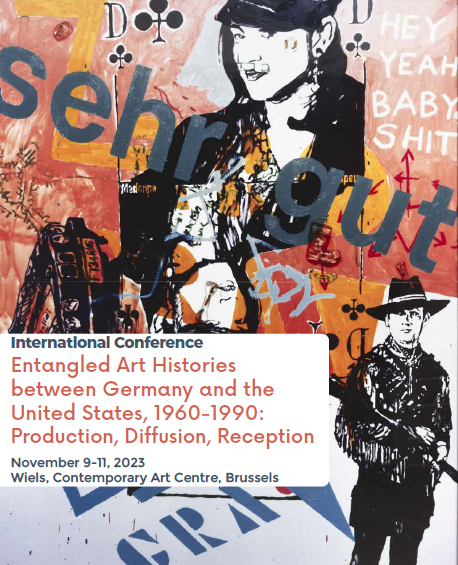
Wiels, Contemporary Art Centre, Brussels
The conference suggests to explore the complex relationships, interactions and collaborations that took place between the West and East German and the North American art scenes in the period from the 1960s to the 1990s. While documenta 2 in 1959 allowed the German public to discover Abstract Expressionism as a specifically American art movement, it was not until the early 1960s that a sustained and intense transatlantic dialogue has been established on the artistic, socio-cultural, institutional and economic levels. In the wake of movements such as Fluxus, Pop art, Minimalism and Conceptualism, a dense and extensive international network was gradually set up, involving artists, museums, galleries, curators, critics, and the art market.
Even today’s historiography often tends to view transatlantic relations in hierarchical terms, emphasizing American political, economic, and cultural domination. Instead of thinking of these relationships in terms of influence, preponderance or dependence, the focus will be on the study of interweaving, crossover and interference. In this respect, the theme of this conference is in line with what historians Michael Werner and Bénédicte Zimmermann have defined as an entangled history (histoire croisée). Hence, the objects of research are considered not “only in relation to each other, but also through each other, in terms of relations, interactions, circulation.” With regard to our field of study, this concerns the artists as much as the institutions, the market, the critical and theoretical discourse.
Program:
THURSDAY, 11.09.2023
14:00 Valérie Mavridorakis (Sorbonne Université, Paris), Alexander Streitberger (UCLouvain), Erik Verhagen (Université de Lille): Reception and Introduction
Session 1: Entangled Receptions
Chair: Valérie Mavridorakis (Sorbonne Université, Paris)
14:30 Alexander Alberro (Columbia University, New York City): Artists, Critique, and the New York-Cologne Axis in the 1980s and 1990s
15:15 Stefano Agresti (La Sapienza University of Rome): Network as an Expansion Strategy. Robert Barry and the Development of Artistic Relations of the Galerie Paul Maenz in Cologne
16:00 Coffee break
16:15 Erik Verhagen (Université de Lille): 1967-1973: Franz Erhard Walther in New York
17:00 Anja Isabel Schneider (Universidad de Castilla – La Mancha): First exhibitions at Marian Goodman Gallery, New York: A dialogue between American and European artists
17:45 End of the day
FRIDAY, 11.10.2023
Session 2: Travel Pragmatics and Exhibition Politics
Chair: Hilde Van Gelder (KU Leuven)
9:30 Gregor Stemmrich (New York University Abu Dhabi): Rauschenberg’s Bed (1955) and documenta 2 (1959) – Histoire Croisée of a Transatlantic Conundrum
10:15 Felix Vogel (University of Kassel): "If it is possible, it is best if you bring your work yourself": Infrastructure, Logistics, Production at documenta
11:00 Coffee break
11:15 Sabeth Buchmann (Academy of Fine Arts Vienna): Infrastructural economies of travel and transport in post-conceptual art of the 1970s and 1980s. The example of the neo-narrative film essay
12:00 Lunch break
13:15 Visit of the exhibition at Wiels
Session 3: Artistic Strategies
Chair: Gregory H. Williams (Boston University)
14:30 Alexander Streitberger (UCLouvain): Must Art Hang? Andrea Fraser and Exhibition Strategies in Germany
15:15 Althea Ruoppo (Boston University): Reinhard Mucha and the Place of Industrial Transnationalism in Assemblage Sculpture: The Wirtschaftswunder, To the People of Pittsburgh
16:00 Coffee break
16:15 Stefaan Vervoort (Gent University): Schütte’s Amerika (1975): A Nietzschean Critique of US Conceptualism in Düsseldorf
17:00 Dirk Snauwaert (director of the Wiels): Critical Distances – Retrospective with Munich Specifics of the Post First Iraq War in German and US Art Relations 1996-2001
17:45 End of day
SATURDAY 11.11.2023
Session 4: East-West Circulations and Vice Versa
Chair: Felix Vogel (University of Kassel)
9:30 Nóra Lukács (Humboldt Universität Berlin): Charles Simonds exhibiting at Jürgen Schweinebraden’s ‘EP Galerie’ in East Berlin 1977. The collaboration of a private art institution in the GDR with the DAAD Artists-in-Berlin Program in West Berlin
10:15 Annabel Ruckdeschel (University of Giessen): North American Artists at the GDR’s INTERGRAFIK Exhibitions “For Peace, Friendship, and Anti-Imperialist Solidarity” (1965-1990)
11:00 Coffee break
11:15 Claudia Mesch (Arizona State University): Charles W. White in East Berlin: Progressive Art History and the Limits of Socialist Solidarity in the German Democratic Republic, 1951-1978
12:00 Gregory H. Williams (Boston University): Belated Recognition: US Critical Reception of East German Art in the 1980s
12:45 Final discussion
